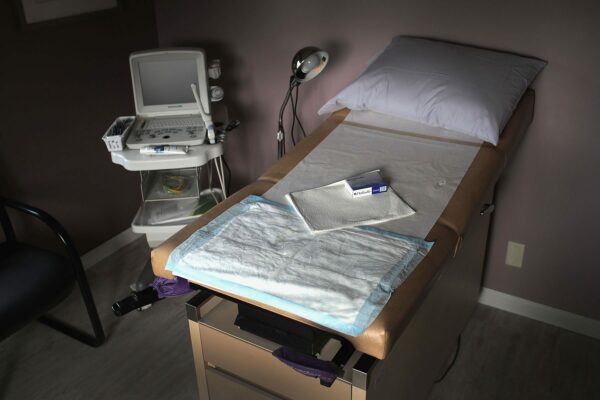Connecting state and local government leaders
Lawmakers convene to introduce a near-total ban, just weeks after a 10-year-old had traveled to Indiana to receive an abortion unavailable in her home state.
Originally published by The 19th
Indiana is convening a special session to pass new abortion restrictions, becoming the first state to do so since the Supreme Court decision dismantled federal abortion protections.
Many legislators, courts and advocacy groups across the country are watching Indiana as other states continue to face legal and logistical challenges to implementing old trigger laws and new bans in the aftermath of the Supreme Court overturning Roe v. Wade and its abortion protections. The White House is also paying attention: Vice President Kamala Harris met with state legislators on Monday before the testimony period began.
Gov. Eric Holcomb on June 22 signed a proclamation calling the General Assembly, which has a Republican supermajority in both chambers, back for a special session originally slated for July 6 before being postponed to July 25. The special session must end by August 14, according to Indiana code.
Abortion in Indiana is currently legal up to 22 weeks after the last menstrual period, but people seeking an abortion must wait 18 hours before getting the procedure and are required to undergo counseling and an ultrasound. When Roe was overturned last month, Indiana did not have in place a trigger law that would have quickly implemented a ban. In the month since, lawmakers working to draft new abortion legislation have received thousands of letters, emails, phone calls and visits from constituents. Republicans in the state Senate unveiled their proposed legislation July 20, days before the special session was set to begin.
One bill would completely ban abortion with a few narrow exceptions, including if the life of the pregnant person is at risk and in cases of rape or incest. Another proposed bill would provide nearly $50 million to programs and services dedicated to supporting pregnant people and young families.
State Sen. Sue Glick, a Republican and author of the first bill, known as Senate Bill 1, said: “Many in the pro-life movement have long believed in exceptions to abortion restrictions for life of the mother, and that exception is included in the bill. In addition, we recognize that there are heartbreaking cases where, because of violence committed against women and young girls, we have provided for some additional exception.”
The special session comes as a high-profile child rape case put Indiana in the national spotlight and highlighted the real-world impact that its laws will have on Hoosiers and those in surrounding states. Earlier this month, reports circulated of a 10-year-old girl who was sexually assaulted in Ohio, became pregnant and traveled to terminate the pregnancy in Indiana. National and international media highlighted the story; the doctor who performed the abortion faced public and media scrutiny; and Indiana Attorney General Todd Rokita announced on Fox News that he would investigate the situation.
Harris announced last week that she would be traveling to Indianapolis to meet with state legislators Monday to “discuss the fight to protect reproductive rights.”
If passed as proposed, the two Senate bills would go into effect September 1.
Glick said the proposed legislation is “not about criminalizing women,” and emphasized that it would not affect access to the morning-after pill or any other method of birth control. It also would not affect treatment of miscarriages, ectopic pregnancies or in vitro fertilization procedures, she said. And in terms of enforcement, the bill does not create any new penalties for doctors who perform abortion — instead relying on existing policies that would revoke a doctor’s license for performing an illegal abortion, Glick added.
If the proposed legislation is passed unchanged, Indiana would be one of at least eight states to ban abortion from conception, according to the Guttmacher Institute. Unlike Indiana’s proposed legislation, however, many don’t have any exceptions to their bans. In Alabama, Arkansas, Missouri, South Dakota and Texas, for instance, have abortion bans with no exceptions for rape or incest.
When Senate Republicans announced their proposed bill, Democratic legislators were quick to condemn any restrictions to abortion. The ACLU of Indiana also released a letter signed by more than 200 businesses opposing restrictions, though some of the state’s largest firms remained silent. Ryan Mears, one Democratic prosecutor, even announced his office would not prosecute abortion-related crimes, regardless of the new law. A recent survey found that more Hoosiers opposed abortion after six weeks, but that the majority supported abortions in cases of rape and to save the life of the pregnant person.
Sen. Rodric Bray, a Republican and president pro tempore of the Indiana Senate, introduced Senate Bill 2, the bill that would allocate millions of dollars to support pregnant women, before and after birth.
“While we may have educated guesses about what kind of support may be needed following the implementation of Senate Bill 1, no one can predict exactly what services will be needed in post-Roe Indiana” Bray said last week when unveiling the legislation. “That said, this special session, we intend to use Senate Bill 2 to add an additional $50 million to programs to support women who are or may become pregnant.”
The majority of the funding would go toward the creation of the Hoosier Families First Fund, which would feed what the bill described as pregnancy resource centers, access to contraception and pregnancy planning and a community health program that connects first-time mothers with nurses. The bill includes language that would increase access to child care for low-income families and provide additional support for foster and adoptive families. The remaining $5 million would go to increase the cap on Indiana’s adoption credit from $1,000 to $10,000.
If the measures pass, the budget committee will review how the money is allocated in January when they reconvene for a budget session.

NEXT STORY: A Local Government Plans to Pay Off Millions in Residents' Medical Debt




